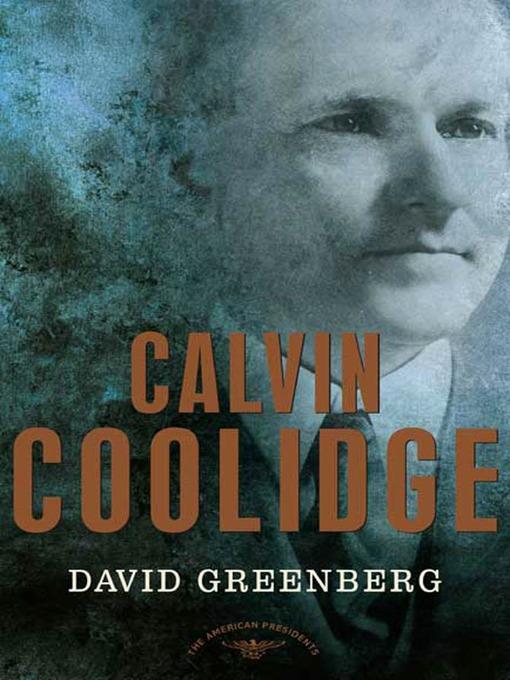
Calvin Coolidge
The 30th President, 1923-1929
فرمت کتاب
ebook
تاریخ انتشار
2006
نویسنده
Arthur M. Schlesinger, Jr.ناشر
Henry Holt and Co.شابک
9781466823044
کتاب های مرتبط
- اطلاعات
- نقد و بررسی
- دیدگاه کاربران
نقد و بررسی

January 1, 2007
As America's 30th president, Calvin Coolidge, popularly known as "Silent Cal," had a record that "was neither substantial nor enduring"; still, Ronald Reagan considered him "one of our most underrated presidents," and historian and author Greenberg (Nixon's Shadow) sets to find out why in a precise and objective record of Coolidge's long political career. If Coolidge's commitment to minimalist government in turn minimized his contributions to the nation, he was regarded well during his two terms, probably because of "robust economic productivity" and his prescient use of growing public relations infrastructure, utilizing radio, film and photography to run a front-porch campaign "long before the term 'photo op' was coined." Coolidge's personal commitment to austerity allowed him to"pare spending in almost every government department" and cut taxes four times; by the "end of his second term, most Americans paid no federal income tax at all." Though Black Thursday devastated the stock market on his watch in 1929, at the end of his presidency "standard accounts affix some blame to his policies," but "even Coolidge's harshest critics agree that the roots of the Depression lie deeper than any policies of one man." Greenberg's history takes readers ably but unsurprisingly from rustic, post-Civil War Vermont to, in Coolidge's words, "a new era to which I do not belong," showing along the way how his personality and politics helped him regain relevancy in political struggles yet to come.

January 1, 2007
After Ronald Reagan publicly expressed his admiration for "Silent Cal," interest in the 30th President increased. Instead of a true biography, Greenberg (history & media studies, Rutgers Univ.; "Nixon's Shadow: The History of an Image") has produced a rather penetrating analysis of Coolidge. We learn just enough of Coolidge's formative years and his time in Massachusetts politics as a state legislator and governor to understand his unbending rectitude and deep faith in traditional American values. Moving quickly through his years as vice president under Harding, Greenberg gets to his focus on Coolidge as President, establishing a context for Coolidge's administration and detailing its accomplishments and failures. Widely satirized for his bland character, Coolidge here is presented as a more complex and engaging individual. Although a product of the 19th century governing in a time of dramatic changes he personally disdained, Coolidge guided the nation through upheavals like the scandals of Harding's administration, the reemergence of the KKK, and battles over immigration policy. The reader is left with a somewhat sympathetic appraisal of the man but a more critical evaluation (and justly so) of the President. Engaging and thoroughly researched, this book is recommended for all academic libraries. Public libraries with limited resources that already possess Robert Ferrell's "The Presidency of Calvin Coolidge" may not wish to purchase, but the two books complement each other very well.Thomas J. Baldino, Wilkes Univ., Wilkes-Barre, PA
Copyright 2007 Library Journal, LLC Used with permission.

December 15, 2006
The famously taciturn thirtieth president, affectionately dubbed Silent Cal, had been an award-winning student orator and delivered effective if unexciting speeches throughout his political career (must have: he lost only one election in 30 years). He conducted more presidential press conferences (his immediate predecessor, Harding, invented them) than any other president. He embraced radio and the movies, the modern media of his day, and provided photo ops at the drop, or replacement--he once donned an Indian ceremonial headdress--of a hat. He really was reserved, but he cultivated his relative silence to suggest humility and perspicacity; fortunately, he also had a ready, dry wit. Intellectuals and pundits groaned about him, but the general public, including, then and later, Ronald Reagan, adored him. Greenberg argues that while his management of his image was ahead of his time, his conception of presidential power--limited, hands-off, better delegated--was utterly of it. Coolidge was, Greenberg implies, a true progressive conservative, genially fatalistic about change, indulging its benefits while deploring the altered morals it facilitated.(Reprinted with permission of Booklist, copyright 2006, American Library Association.)

























دیدگاه کاربران